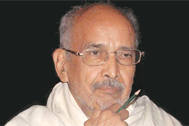Nature Talk
Dr. Brama Dev Sharma

Dr. Brahma Dev Sharma passed away on 6th December 2015 at Gwalior. He was 85. With his death an eventful and remarkable journey that he had begun as scholar teacher in mathematics, thus, came to an end. Newspaper headlines used veritable phrases to express their admiration for this unusual man. He was held as ‘Advocate of Tribal Rights’, ‘Merged in tribal cause’ ‘Voice of the Voiceless’, ‘Officer and A Revolutionary’, ‘The Hero of Bastar’ , ‘The In-Betweener’, to cite a few. A member of Indian Administrative Service (IAS), he opted out of it, albeit serving for a few years. For him it was too restrictive on his desire for an all out involvement in genuine service to the underprivileged and deprived section of the people. Yet it was these few years of service as a bureaucrat, particularly his stint as the first Collector of the undivided Bastar district of Madhya Pradesh brought him face to face with the problems of a highly agitated tribal population, who had lost their popular king Maharaja Pravir Chandra; Maharaja was killed by the police for allegedly leading a tribal uprising. He could fathom the sources of their grievances and took bold decisions like giving land to the landless, stopping all mining leases and throwing out foreign corporations but not without risking his life and irking the power that be. Yet he could not be ignored but sought after by the governments on tribal issues, whether he remained in bureaucracy or out of it. He had emerged as an expert, par excellence, on Indian tribes with his in depth theoretical understanding and field experiences. He was sought to serve as the Vice-Chancellor of NEHU, when the incumbent Vice-Chancellor was shot dead and none was willing to take over. It is well known that his tenure could bring about a lot of improvement in the academic and community life in NEHU campus. Later he was sought to serve as the SC/ST Commissioner, which he readily accepted and served it with one rupee salary. After all to serve the tribal population and the underprivileged people was his ultimate mission. He was sought to be the mediator between the government and the Maoists, when in Chhattisgarh the collector of Sukma district Alex Paul Menon was abducted by the Maoists. He could persuade the Maoists to release him. Needless to say he never shied away from any responsibility be it assigned to him by the government or by the forces opposed to the establishment, if he foresaw the opportunity to intervene in favour of people at the bottom. It was this section of population who always remained central to his discourse on development. A true Gandhian in thought and action, he lived simplest possible life, very close to the living of an average rural Indian. He wanted to raise the common people and make them participate in a movement, which he called Bharat Jan Andolan. Through this movement he also wanted to raise the consciousness of urban Indians to realize the plight of their less fortunate brethren. He sincerely tried these, moved around the country, meeting different groups engaged in people’s activities. One does not know to what extent he succeeded in his objective. But the ideas he has put in black and white are worth meditating upon, particularly for those who sincerely wish the planning should begin from below if India is to be made into a country with a sound sociological ecology in the midst of diversities. Three decades ago, Dr. Sharma had conceptualized the process of planning from below which he had articulated in his book Planning For Tribal Development under the heading Planning From Below. He never believed tribal people as lacking skill instead, he believed, “in terms of skills of their individual members” the tribal communities are perhaps the “highest skilled groups.” He, however, did recognize that “the advanced communities score over them only on account of specialization and organization”. He therefore never accepted that “the absence of a high level of specialised skills” can be “interpreted as non-existence of any skill.” His emphasis was on the identification of such skills, which he believed could make the planning from below quite realistic. Along with such identification, according to him, “if steps could be taken to harmonise the traditional rights and the modern frame, it may be possible to protect the tribal interest and give him a sense of confidence to deal with the new system.” He could also foresee planning from below to result “in an optimum utilisation of the natural resources for development in general.” This chapter is reproduced in this issue of The Tribal Tribune as our tribute to this great soul.
The Tribal Tribune believes that the indomitability of purpose that Dr. Sharma has left behind as an example, shall be cherished by the activists fighting for the upliftment of the tribal people and downtrodden communities in the society. (BKN)



